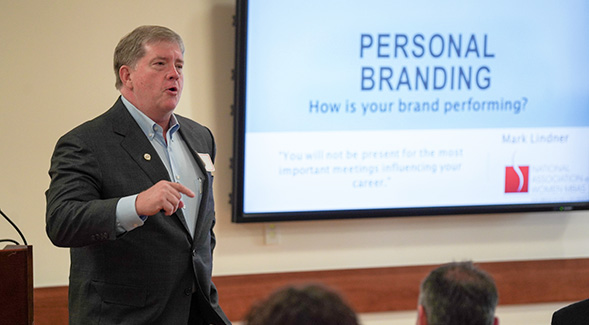The Importance of Personal Branding
Longtime SDSU supporter Mark Lindner hosted a virtual personal branding workshop for students and alumni.

On June 4, the Fowler College of Business partnered with Mark Lindner, general manager for Molson Coors Beverage Company and recognized expert in personal branding, to host a virtual interactive workshop for San Diego State University students and alumni — another example of the university’s efforts to provide students with high-value skills to succeed in the workplace.
Lindner and his wife, Debbie, have been supporters of SDSU and its students since 2015 when they made an initial gift to fund the Mark and Debbie Lindner Internship Scholarship within the Fowler College of Business. Lindner is based in Pennsylvania, but travels to San Diego regularly to share his expertise on personal branding and marketing and to mentor students.
The virtual workshop, organized through the Fowler College of Business Career Management Center, focused on educating students and alumni about the importance of identifying and maintaining a personal brand. The virtual event drew more than 90 student and alumni participants.
Your brand is what differentiates you
Lindner defines a “brand” as something that differentiates a product, person, company, or concept from others in the same market and the promise of value associated with that brand.
“Exhibiting your personal brand is a 24/7 job,” Lindner explained. “It is who you are and what you want to convey to everyone you interact with. If your personal brand is correct and authentic, every conversation and activity will fit the narrative you are building with your brand.”
Among the key takeaways from Lindner’s workshop:
1. Understand your personal brand: It is necessary to thoroughly understand your personal brand to be able to determine the skills and attributes where you excel. “What can you do better or different than anybody else?” Understanding this will help you develop and build a successful personal brand. In addition to skills and attributes you need to understand your ‘social opinion.’ This is how you are seen by others. “What value do you bring to the team and how do you interact within a team environment?”
This worksheet provided by Lindner is a helpful tool for identifying and developing your personal brand.
2. Add value: To add value within a group environment, you need to determine how your skills and strengths support a team. “What do people go to you for?” You must try to understand why the team needs you.
3. Maximize your brand’s adoption: Once you determine your brand, you need to make sure your actions, mannerisms and appearance match your brand. “You want to keep conveying that brand so (your managers) know that this is the person I want to have on my team for a long, long time,” Lindner noted.
4. Monitor your brand: Make sure you are clearly communicating that your brand matches “what you want it to stand for,” explained Lindner. One of the best ways to do this is to “fact check” your brand by asking others for feedback. The person you ask should not be a friend, but a colleague who you trust who can give you honest feedback.
5. Your brand should evolve: Finally, your personal brand should evolve with experience, but one of the most challenging things to do is to change people’s perception of your evolved brand message. “It becomes even more important to advertise your brand message and consistently stay on that brand message,” he explained. People’s perception of your brand’s evolution “doesn’t happen immediately, it happens over time and controlling your brand message and advertising it becomes really critical.”
Lindner also offered advice about finding a mentor. “Look for someone who believes in your brand…and who will stand up for you, though you will also have to be open to some criticism as well.”



